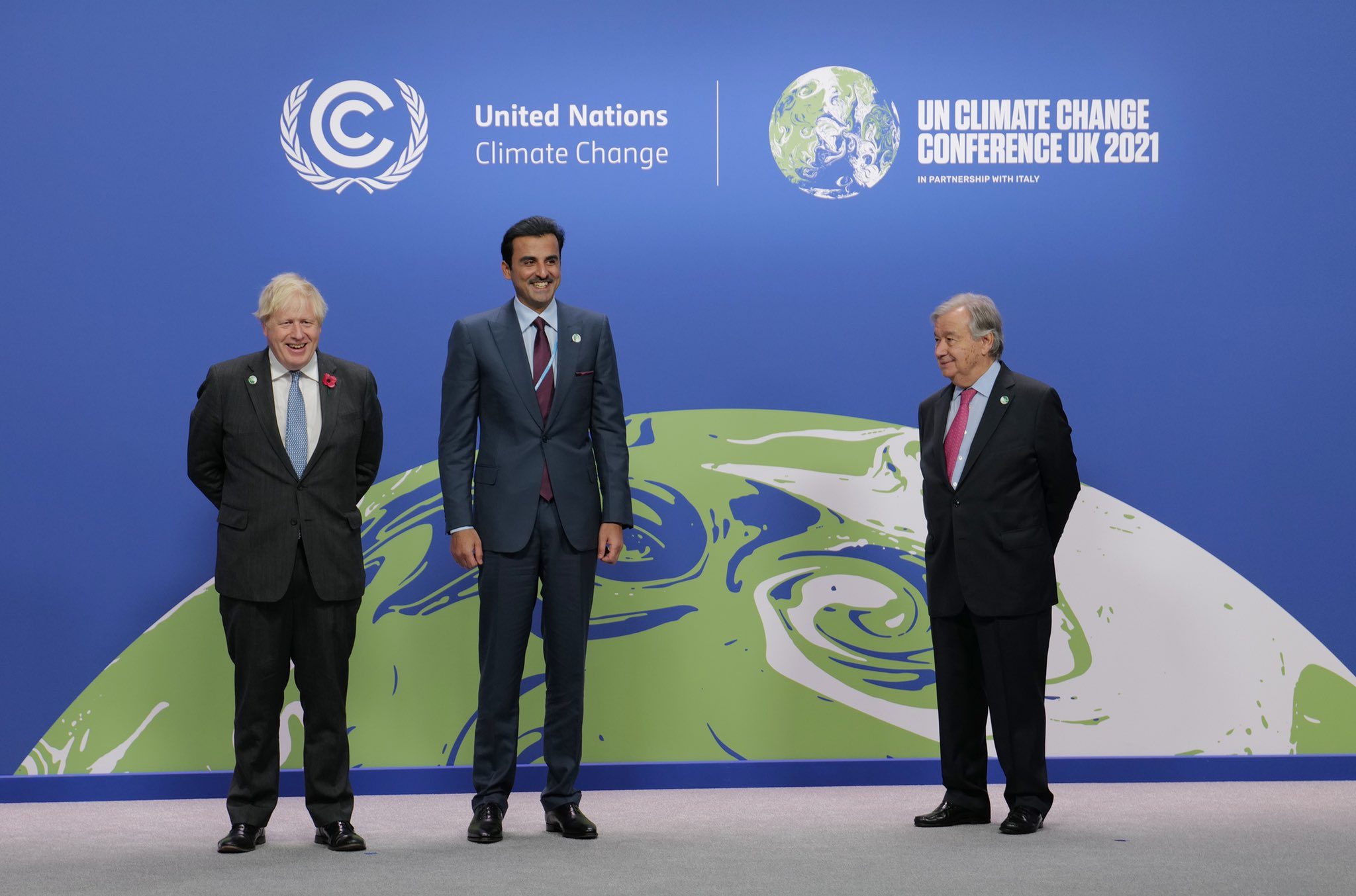The Gulf state was among the participants at the global COP26 Summit.
Qatar is the world’s largest producer of liquefied natural gas. The latest cabinet reshuffle by Qatar’s Amir Sheikh Tamim bin Hamad Al Thani last month saw the re-creation of an environment and climate change ministry, headed by Minister Faleh bin Nasser Al Thani.
Among the most recent of activities by the new ministry, formed just weeks ahead of the ambitious UN Climate Summit or COP26 in Glasgow, was the unveiling of a national climate change action plan aimed at achieving a 25% reduction in greenhouse gas emissions by 2030.
This is in line with Qatar’s latest updated NDC (National Determined Contribution) submitted to UNFCCC in August as part of Paris Agreement Commitment.

Qatar’s move follows other Gulf Arab states, including the United Arab Emirates and Saudi Arabia, both of which announced net-zero emission target by 2050 and 2060 respectively ahead of the COP26 climate change summit in Glasgow.
Qatar’s national action plan on climate change was developed in coordination with more than 50 entities within the country. The comprehensive plan sets goals at the national level to confront climate change through more than 35 mitigation initiatives and more than 300 adaptation initiatives.
Recently, Qatar criticised nations for making vague net-zero pledges, saying it would be wrong to commit to eliminating planet-warming emissions without having a proper plan in place after neighbouring country UAE announced it would become the first of the Persian Gulf’s petrostates to announce Net Zero by 2050.
This was followed by Saudi Arabia and Bahrain who set their eyes on 2060.
The issue is that the UAE and several other nations planning to net-out emissions have offered few details on how they’ll achieve their targets, beyond that they’ll invest more in renewable energy.
Qatar is the world’s largest producer of liquefied natural gas and still aims to expand LNG production to 127 million tonnes annually by 2027. It says its gas production helps combat climate change globally because it can help the world shift from high-polluting fuels like oil and coal to renewable energies. The plan pledges to intensify efforts at carbon capture and storage at its gas production facilities.
This planned pledge was recently criticised by Clean Air Task Force researcher Jonathan Banks, who was quoted by Climate Home as saying: “Qatar has maintained a pioneering role in the international efforts to tackle climate change & promote sustainable development through the export of natural gas and its derivatives to the world’s energy market is a misleading statement for sure.”
Burning gas produces less carbon dioxide than burning coal or oil – but emissions from the production process can sometimes cancel out these benefits.
Qatar’s amir joins world leaders in Glasgow for COP26 climate summit
Well, for oil and gas countries like Qatar who are planning a fair transition away from fossil fuels, this will take a long time – so it’s best to start early.
While its long-term vision may be ambitious with the 25% reduction of CO2 by 2030, some quick wins like tackling emissions of methane, a more potent warming gas than carbon dioxide, can be undertaken.
This was the case – and a positive step – started by the United States, Canada, Norway, Saudi Arabia and Qatar at the Net Zero Producers Forum which outlined strategies to stop methane leaks and flaring, deployment of carbon capture and storage technologies, diversification from reliance on hydrocarbon revenues, and other measures, in line with each country’s national circumstance.
Also, a plastic ban could be another quick win, especially as plastic production continues to expand worldwide, fuelled in part by large oil production.
Some reports say plastic contributes to greenhouse gas emissions at every stage of its lifecycle, from its production to its refining, and the way it is managed as a waste product.
Plastic is just a form of fossil fuel. The emissions associated with plastics production and incineration could account for 56 gigatons of carbon between now and 2050.
Also, individual attention to our own footprint is also critical to understanding our own impact on the environment. Carbon emissions from your lifestyle choices, from transportation to diet, impact the climate.
This is a global problem, but anyone can be part of the solution, as seen in a recent project led by the Arab Youth Climate Movement Qatar Measuring Household Carbon Footprint project as part of a wider programme to increase awareness among stakeholders in Qatar of the climate impact of community actions.
In the long run, economic diversification is one of the key, high-profile and long-term initiatives proposed by Qatar to propel growth and prosperity in a bid to move beyond its dependence on fossil fuels.
Although various diversification initiatives have been rolled out, Qatar has yet to venture fully into innovation.
However, a recent announcement by Qatar and Rolls-Royce to team up in a multi-billion-pound project to develop and invest in green technology start-ups in the UK and the Gulf Arab state is a great start.
Qatar needs such a parallel economic stream that depends on research, innovation, and technology in the field of the low carbon sector, which is not limited to renewable energy but rather exploring a broader scope that looks into water, waste, transport, etc.
New frontier for climate action
In the last few months, there has been a heightened interest on climate change issues across the Gulf region, with new climate envoys, ministries, net zero announcements, and more focused implementation of various strategies and roadmaps to reduce emissions and achieve net zero.
What we’re witnessing is a noticeable shift, with greater involvement and even leadership coming from senior members of governments keen on moving away from the positions of the past.
The new targets align the state of Qatar with most major economies and has undoubtedly raised expectations. Furthermore, the participation of Qatar’s Amir Sheikh Tamim – the only Gulf leader at this year’s COP26 UN Climate Summit in Glasgow – shows Doha’s commitment to climate action beyond its borders.
Neeshad Shafi is an environmentalist, speaker, and policy-oriented social change advocates, best known for his work on environmental and climate change policy in the Gulf and Middle East.
The views and opinions expressed in this article are those of the authors and do not necessarily reflect the official policy or position of Doha News, its editorial board or staff.
Follow Doha News on Twitter, Instagram, Facebook and Youtube







